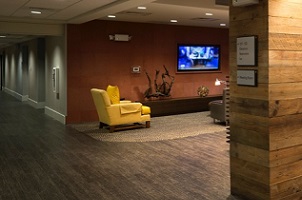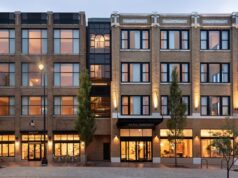
Designing for the ultimate guest experience begins from the ground up. From the moment guests enter a hotel lobby, they should feel quality in every step, and the warmth and elegance of real hardwood floors make a huge impact on the crucial first impression. When designing for a spectacular hospitality experience, the most important decision—even more so than aesthetics—lies in choosing sustainable building materials that will look equally beautiful in year five as they did on day one. The flooring specified must be able to withstand thousands of guests in heels, countless wheeled carry-ons and damaging luggage carts, while retaining their original beauty.
We believe acrylic-infused, engineered wood floors are the only sustainable option that offers unmatched durability, design flexibility and lower life-cycle cost. With the understanding that product performance and sustainability go together, here are five factors that make acrylic-infused hardwoods the most sustainable and cost-conscious option.
The Value of Transparency
All hardwood floors are not created equal. In the flooring industry, so much of the excess from manufacturing can result in waste, and leftover raw materials and chemicals used in processing can have a major effect on the environment. Reusing leftover materials—for example, sawdust—as an energy source reduces unnecessary energy use and the amount of waste that would otherwise end up in landfills.
Third party certifications like FloorScore Certification exist to help differentiate which companies are doing their best to reduce environmental impact in every step of the supply chain. We strongly advise that any hardwood floor you choose is certified by the Forest Stewardship Council (FSC), who through sustainably managed harvesting, ensures forests are preserved so they can thrive for generations to come.
Unmatched Durability: Weighing the Alternatives
Over time, hardwood flooring is more forgiving underfoot than tile, concrete or other hard materials. We take durability one step further, producing planks with an acrylic-infused top layer. The resulting product is up to 300 percent more durable than untreated standard wood, dramatically reducing the risks of chipping, splintering and denting.
With proper care and maintenance, hardwood floors can last a lifetime. With no need for replacement, there is no excess waste to haul away to landfills; no need to fix a problem with new adhesive; no additional carbon emissions from shipping new goods; no cause to spend money to remove and replace with an entirely new product. The most sustainable, cost-efficient practice is to ensure a specified product will be the last product of its kind needed in a space’s lifetime.
Breathe Easier: Improved Indoor Air Quality
Hardwood floors help promote better overall indoor air quality in a venue or facility, which can be a big benefit for employees, guests and business partners alike. Unlike carpet, it’s impossible for the likes of dust and allergens to embed themselves into hardwood flooring. For this reason, hardwood floors are the ideal choice for guests and employees who suffer from allergies.
This isn’t to say that allergens and bacteria aren’t still present in an environment that has hardwood floors, but these particulates are more easily cleaned up through routine cleaning and don’t require professional deep cleaning as is often the case with carpet.
Room for Creativity
 The visual design of the hardwood chosen is just as important as the material itself. Real wood planks simultaneously offer aesthetic appeal and opportunity for unlimited creativity. Individual planks can be easily manipulated to define borders, create interest and change direction, creating a customized floor plan to perfectly suit your space. With a wide variety of color stains and patterns available and state-of-the-art color match technology, it’s easy to get creative. Whether a hotel has a unique, one-of-a-kind design or has a more traditional feel, there is a custom flooring design to match. And why stop at what’s beneath your feet? We’ve seen designers use acrylic-infused, engineered wood product on walls, ceilings and more.
The visual design of the hardwood chosen is just as important as the material itself. Real wood planks simultaneously offer aesthetic appeal and opportunity for unlimited creativity. Individual planks can be easily manipulated to define borders, create interest and change direction, creating a customized floor plan to perfectly suit your space. With a wide variety of color stains and patterns available and state-of-the-art color match technology, it’s easy to get creative. Whether a hotel has a unique, one-of-a-kind design or has a more traditional feel, there is a custom flooring design to match. And why stop at what’s beneath your feet? We’ve seen designers use acrylic-infused, engineered wood product on walls, ceilings and more.
Lower Life Cycle Costs = Greater ROI
So why make the investment? Compared to natural wood, concrete or commercial sheet vinyl, engineered wood flooring is significantly less expensive to own over its lifetime. Despite higher initial investment, the material requires less care and virtually no replacement. The success or failure of every specification made is determined long after the project is complete, as product failures can damage a hotel’s reputation and cause a financial nightmare. The true cost of a flooring failure is not just in the replacement; many properties must close while new flooring is installed, resulting in revenue losses.
For more savings, here’s a tip: buyers can save up to 20 percent or 30 percent off material pricing when there is adequate volume to obtain price discounts. To pinpoint the right flooring for a project, it’s important for buyers to have open communication with sellers to ensure they are getting the best pricing based on expected volumes, the most sustainably produced materials and the best options to suit the project’s distinct aesthetic needs.
About Jason Brubaker
Jason Brubaker is the Vice President of Sales and Marketing with Nydree Flooring, a Forest, Va.-based manufacturer known for producing acrylic-infused engineered wood flooring, founded in 2001 with the acquisition of Gammapar acrylic-impregnated wood flooring and its primary competitor, PermaGrain, in 2003. These technologies have been refined since 1968 and are used to manufacture extremely durable, design-centric, acrylic-infused engineered wood flooring products. Nydree Flooring delivers a constant focus on innovation backed by a strong commitment to sustainability. The company is FloorScore certified and is Chain of Custody certified by Scientific Certification Systems to Forest Stewardship Council standards (Chain of Custody Number SCS- COC-003343). To learn more, visit nydreeflooring.com.






